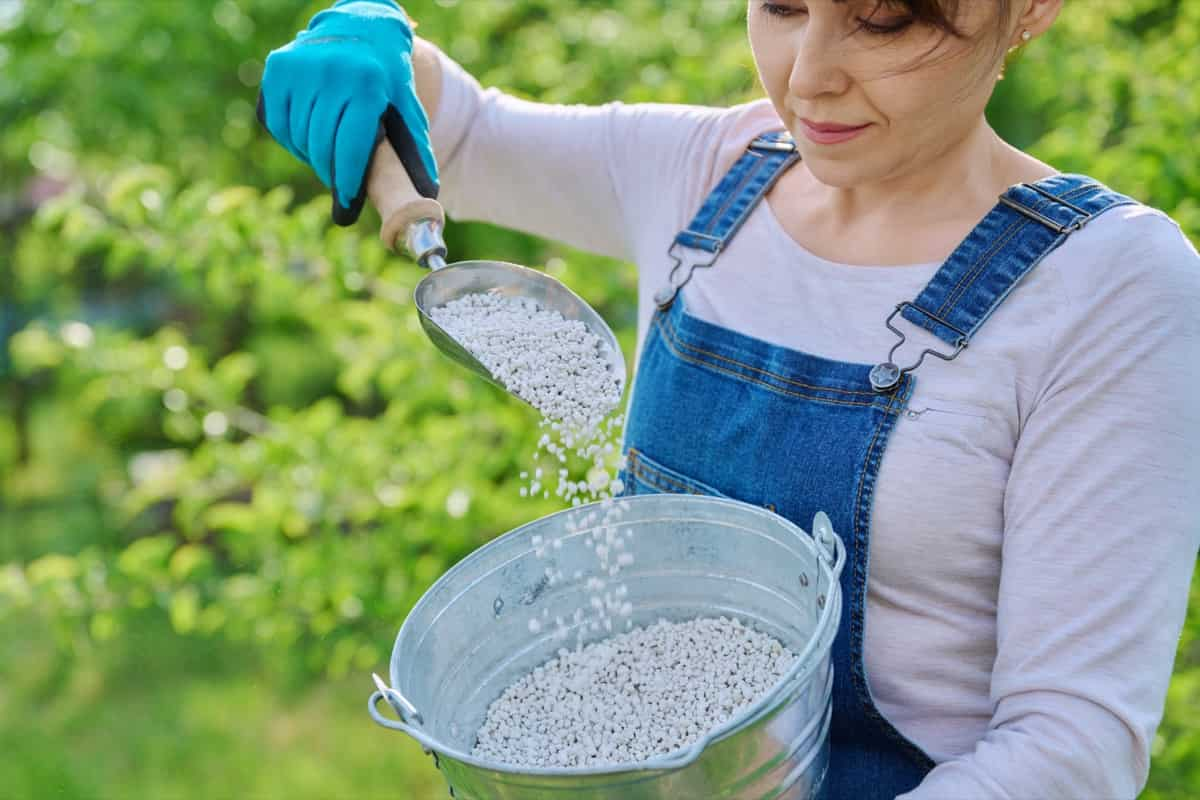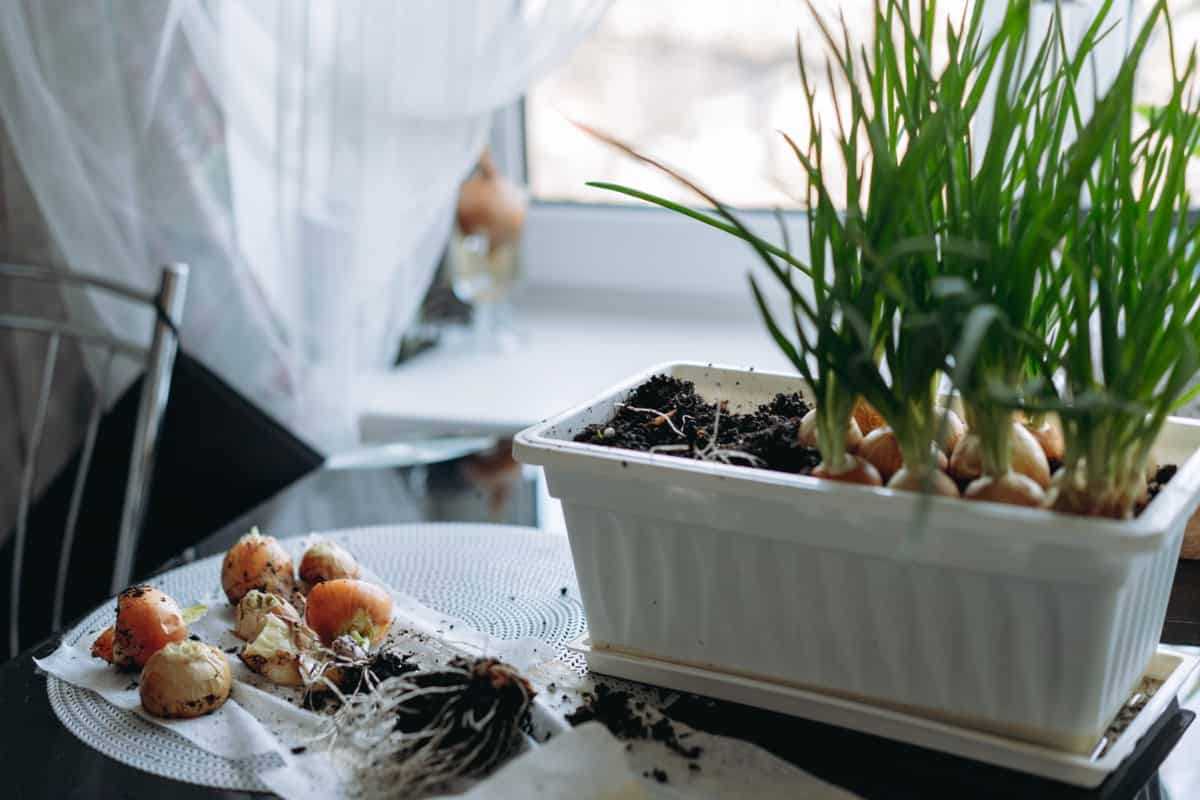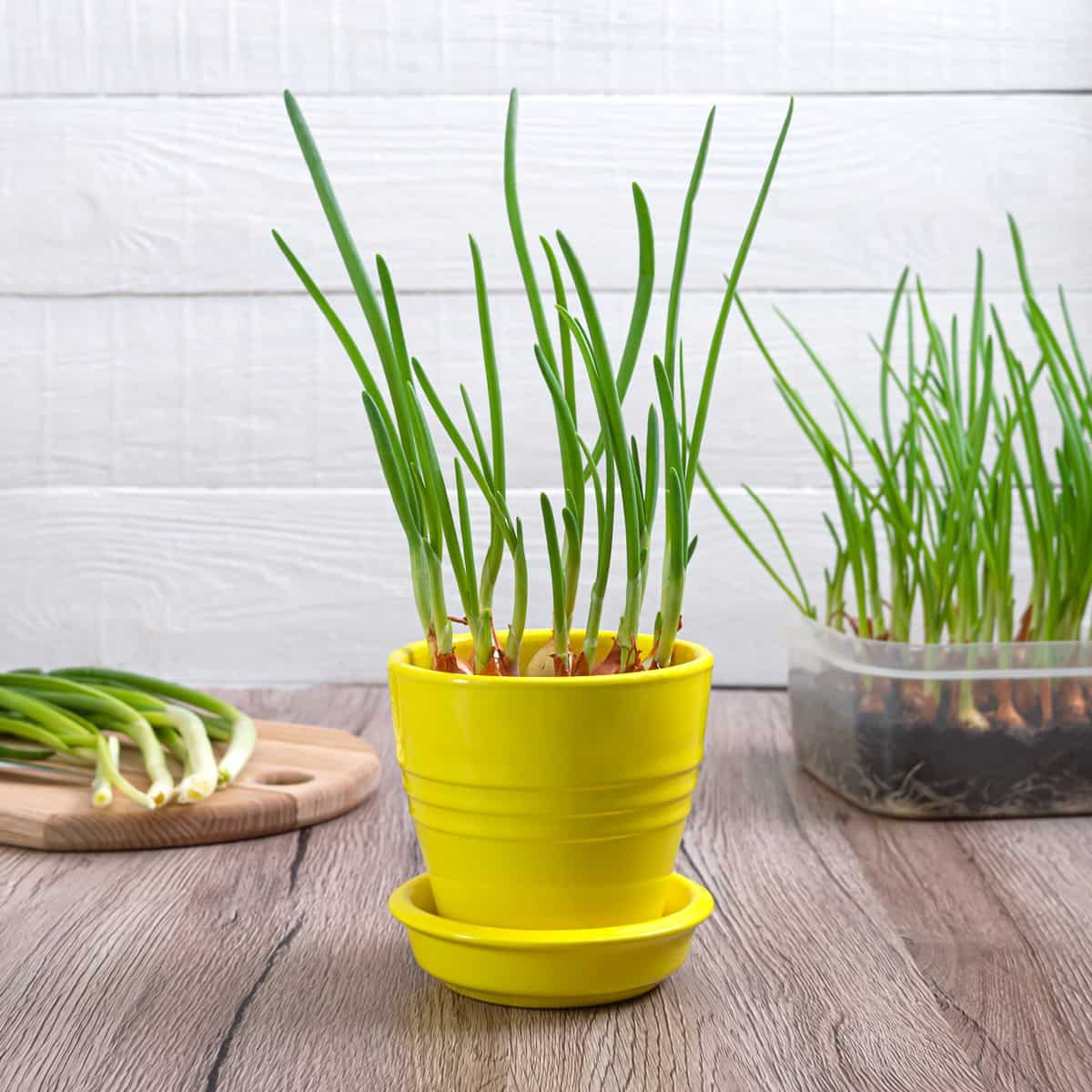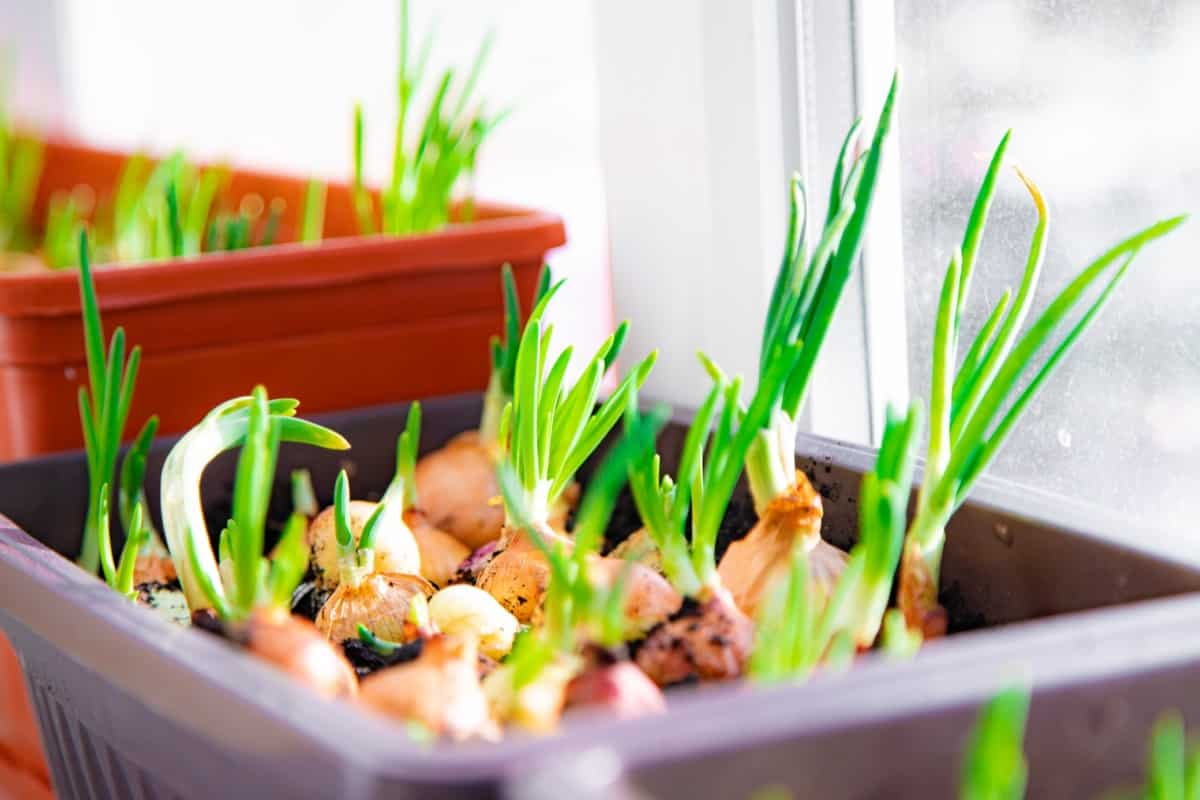When growing onions in pots, fertilizing is crucial for healthy growth and a bountiful harvest. Providing the right nutrients is essential for promoting onion bulb development and enhancing plant vigor. This guide will explore the best fertilizer options for onions in pots, including organic, natural, and homemade alternatives. Also, we will delve into the importance of NPK ratios and discuss when and how to apply fertilizers for optimal results.

Best Fertilizer for Potted Onions
Organic Fertilizers for Onions in Pots: Nurturing Your Plants Naturally
Organic fertilizers play a crucial role in nurturing onions grown in pots. These natural alternatives provide essential nutrients to the plants, promoting healthy growth and improving overall productivity. One popular organic fertilizer for onions is compost, made from decomposed organic matter. It enriches the soil and improves its structure and water-holding capacity.
Another effective option is well-aged manure, which releases nutrients slowly over time. Fish emulsion, made from fish waste, is another organic fertilizer choice that provides a quick boost of nutrients. Using organic fertilizers, you can nourish your onion plants naturally, ensuring a bountiful harvest in a sustainable and environmentally friendly manner.
Natural Fertilizers for Onions in Pots: For Environmentally-Friendly Options
Seaweed Extract
Seaweed extract is derived from seaweed and contains many nutrients, trace minerals, and growth-promoting hormones. It enhances root development, improves plant vigor, and increases resistance to stress. Seaweed extract can be applied as a foliar spray or added to the watering can for regular watering. It is especially beneficial during the early stages of onion growth and periods of high temperature or drought stress.
Worm Castings
These, also known as vermicompost, are a nutrient-rich organic fertilizer produced by earthworms. It contains high levels of beneficial microorganisms and essential nutrients that promote healthy growth in onions. It can be blended into the potting soil or used as a top dressing around the base of the plants. They improve soil structure, increase water-holding capacity, and enhance nutrient uptake.
Homemade Fertilizers for Onions in Pots: DIY Solutions for Optimal Plant Health
Homemade fertilizers can be eco-friendly for promoting optimal plant health in onions grown in pots. One option is compost tea, made by steeping compost in water for a few days. This nutrient-rich liquid can be applied to the soil around the onion plants. Another DIY fertilizer is a mixture of Epsom salt and water, which provides magnesium to the plants.
In case you missed it: Onion Companion Plants: What to Grow and What Not to Grow with Onion Plants

Additionally, banana peels can be chopped and buried near the onion plants to add potassium and phosphorus. Finally, diluted coffee grounds can be used as a nitrogen-rich fertilizer. These homemade fertilizers can help ensure the successful growth of onions in pots.
NPK Ratios and Their Importance in Selecting Fertilizers for Onions in Pots
NPK ratios are crucial in selecting fertilizers for onions grown in pots. NPK refers to the three essential nutrients: nitrogen (N), phosphorus (P), and potassium (K). These ratios indicate the proportion of each nutrient in the fertilizer. For onions, a balanced NPK ratio of 10-10-10 or 14-14-14 is recommended.
Nitrogen promotes leaf growth, phosphorus supports root development, and potassium enhances bulb formation. By understanding the importance of NPK ratios, onion growers can choose the right fertilizer to meet their plants’ specific needs. It is essential to consider these ratios to ensure optimal growth, yield, and overall health of onions in pots.
Slow-release Fertilizers: Enhancing Nutrient Availability for Onions in Pots
Slow-release fertilizers are valuable for enhancing nutrient availability for onions grown in pots. These fertilizers are designed to gradually release nutrients over an extended period, ensuring a steady supply of essential elements for the plants. Unlike traditional fertilizers that provide an initial surge of nutrients, slow-release fertilizers deliver a sustained release, which helps avoid nutrient deficiencies and excesses.
This controlled nutrient release promotes healthier root development, increased nutrient uptake, and improved plant growth. Additionally, slow-release fertilizers reduce the risk of nutrient leaching, minimizing environmental impact. Growing growers can optimize nutrient availability and improve crop yields by incorporating slow-release fertilizers into onion pot cultivation.
pH Levels and Fertilizer Selection for Onions in Pots: For Balanced Soil Environment
pH levels are crucial in maintaining a balanced soil environment for onions grown in pots. Understanding the optimal pH range for onions, typically between 6.0 and 7.0, is important. To achieve this, selecting the right fertilizer is essential. A fertilizer with a balanced ratio of NPK is recommended.
In case you missed it: Onion Growing Stages Timeline: From Seed Germination to Harvest

Additionally, it is advised to use organic fertilizers to avoid any chemical imbalances in the soil. Regularly testing the pH of the soil and adjusting it accordingly will ensure healthy onion growth and yield. Maintaining the appropriate pH levels and selecting the right fertilizer can create an ideal soil environment for onions in pots.
The Importance of Timing: When to Apply Fertilizer to Onions in Pots
The timing of fertilizer application for onions grown in pots is crucial for their overall health and productivity. Applying fertilizer to onions in pots at specific intervals during their growth stages is recommended. Initially, a balanced fertilizer should be applied when transplanting the seedlings into the pots. As the onions develop leaves, a nitrogen-rich fertilizer can be applied to promote leaf growth.
A phosphorus-rich fertilizer should enhance root development and bulb size during bulb formation. Lastly, as the onions near maturity, a potassium-rich fertilizer can be applied to improve their storage capacity. By adhering to the appropriate timing of fertilizer application, the onions in pots can thrive and produce abundant yields.
How to Apply Fertilizer to Onions in Pots: Techniques for Maximum Effectiveness
To effectively apply fertilizer to onions in pots, follow these techniques for maximum effectiveness. First, choose a balanced fertilizer with equal nitrogen, phosphorus, and potassium. Start by preparing the soil in the pot, ensuring it is loose and well-draining. Apply the fertilizer evenly on the soil’s surface, avoiding direct contact with the onion bulbs.
Water the pot thoroughly after applying the fertilizer to help it reach the roots. For best results, apply the fertilizer every 5-6 weeks during the growing season. Remember to follow the manufacturer’s instructions on the fertilizer packaging. With these techniques, you can maximize the effectiveness of fertilizer application to onions in pots.
Water-soluble Fertilizer for Potted Onion Plants
Water-soluble fertilizers benefit potted onion plants as they provide essential nutrients in a readily available form. These fertilizers dissolve easily in water, allowing the plants to take the nutrients through their roots quickly. Some popular water-soluble fertilizers suitable for potted onion plants include balanced formulas with equal amounts of nitrogen (N), phosphorus (P), and potassium (K).
In case you missed it: How to Pollinate Onion Flowers: Hand Pollination, Natural Pollination Methods, and Tips

These nutrients promote healthy root development, vigorous growth, and increased onion bulb formation. Water-soluble fertilizers often contain micronutrients like iron, zinc, and manganese, which are crucial for overall plant health. Regular application of water-soluble fertilizers can help potted onion plants thrive and produce abundant and flavorful onions.
Conclusion
Fertilizing potted onion plants promotes healthy growth and ensures a successful harvest. Understanding the NPK ratios and applying fertilizers at the right time and correctly will help you achieve optimal results. Following these guidelines, you can nurture your potted onion plants and enjoy a bountiful harvest of flavorful onions.
- Feed Your Flock for Less: Top 10 Tips to Save on Chicken Feed
- Ultimate Guide to Ossabaw Island Hog: Breeding, Raising, Diet, and Care
- Hatching Answers: The Top 10 Reasons Your Chickens Aren’t Laying Eggs
- Eggs and Economics: Breaking Down the Cost of Raising Backyard Chickens
- Defend Your Greens: Proven Methods to Keep Iguanas Out of Your Garden
- Ultimate Guide to Cinnamon Queen Chicken: A Comprehensive Guide for Beginners
- Ultimate Guide to California Tan Chicken: Breeding, Raising, Diet, Egg-Production and Care
- Ultimate Guide to Marsh Daisy Chicken: Breeding, Raising, Diet, and Care
- 10 Types of Chicken Farming Businesses You Can Start for Profits